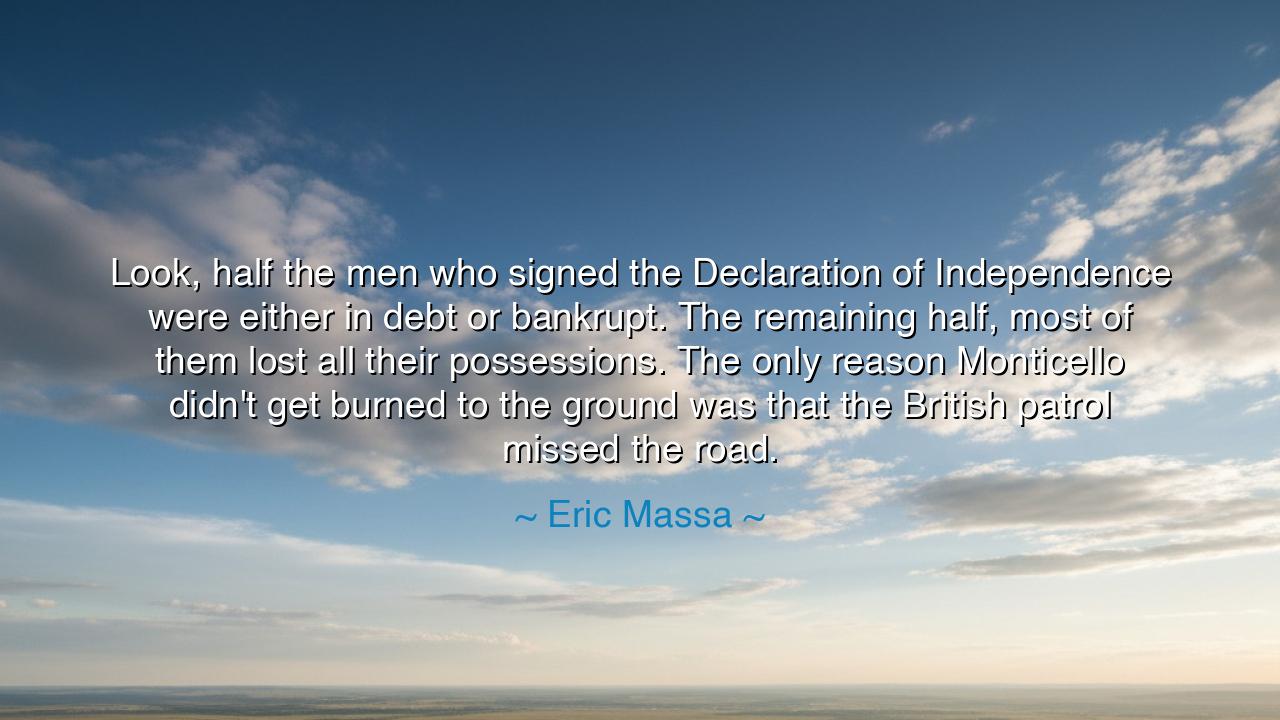
Look, half the men who signed the Declaration of Independence
Look, half the men who signed the Declaration of Independence were either in debt or bankrupt. The remaining half, most of them lost all their possessions. The only reason Monticello didn't get burned to the ground was that the British patrol missed the road.






"Look, half the men who signed the Declaration of Independence were either in debt or bankrupt. The remaining half, most of them lost all their possessions. The only reason Monticello didn't get burned to the ground was that the British patrol missed the road." – Eric Massa
Listen well, O inheritors of liberty, for Eric Massa speaks here not of triumph’s ease, but of its price. His words tear away the polished myth of history and lay bare the raw truth: that the birth of independence was not born in comfort or privilege, but in sacrifice. When the men of 1776 placed their names upon that immortal document, they did so not as secure gentlemen of leisure, but as mortals willing to risk all — their fortunes, their homes, even their lives. These were men already burdened by debt and danger, who nonetheless pledged themselves to a cause greater than self. Their courage was not the absence of fear, but the mastery of it.
The meaning of Massa’s words lies in this revelation — that freedom is not the fruit of wealth, nor the child of safety, but the offspring of conviction. The Declaration of Independence, now read in classrooms and spoken of with reverence, was in its day an act of treason. Those who signed it did so under the shadow of death. Half were impoverished, and the rest would soon be. Their estates were burned, their ships seized, their families hunted. Even Thomas Jefferson, whose home at Monticello still stands as a symbol of the Revolution, escaped ruin not through fortune’s favor, but by chance — for the British patrol missed the road that would have led to his door. In that single detail lies the fragile thread upon which liberty hung.
The origin of this reflection reaches back to the darkest days of the American Revolution, when the dream of freedom seemed a flickering candle in the storm of empire. The signers of the Declaration were not united by wealth or station, but by belief — that a people should govern themselves, that dignity was worth any cost. Benjamin Franklin warned them, “We must all hang together, or assuredly we shall all hang separately.” And indeed, many of them did lose everything. Some died in prison. Some saw their children perish. Yet none renounced their pledge. They had traded comfort for immortality, and in doing so, they carved the word “freedom” upon the heart of the world.
Let us recall one among them — Thomas Nelson Jr., a Virginian signer. When his own home was occupied by British troops during the siege of Yorktown, he turned to General Washington and urged him to open fire upon it. “Destroy it,” he said, “for it shelters the enemy.” His house was reduced to ruins by the cannon fire of his own countrymen — a man sacrificing not only his wealth but his very dwelling for the cause of liberty. This is the spirit that Massa’s words summon: the spirit that values principle above possession, and freedom above fortune.
Massa’s reflection, spoken centuries later, is also a warning to the complacent — that those who inherit freedom without sacrifice risk forgetting what it costs. The signers of the Declaration did not fight for profit or privilege. They fought so that generations unborn might stand upright, unbound by kings or tyrants. Their poverty was the soil from which a nation’s greatness grew. To remember their hardship is to guard against arrogance; to forget it is to invite decay. For liberty, once taken for granted, begins to wither beneath the weight of ease.
The lesson, then, is clear: cherish freedom not as an entitlement, but as a sacred trust, bought with the blood and suffering of those who came before. Prosperity must never dull the moral courage that founded a nation. Every generation must, in its own way, earn again the right to be free — not necessarily through war, but through integrity, through the defense of truth, through the willingness to stand for what is just even when it costs something dear.
So, O listener, let these words settle in your heart: the road to Monticello was once missed by fate, but the road to liberty must never be lost by forgetfulness. Remember the signers, those bankrupt dreamers who wagered everything and gained eternity. Let their example be a compass — that when your own trials come, you too may choose conviction over comfort, and thus keep the flame of freedom burning bright for those yet to come.






AAdministratorAdministrator
Welcome, honored guests. Please leave a comment, we will respond soon